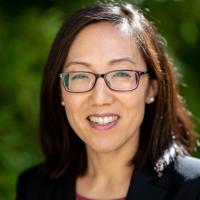
Dr. Amy Kim
Program Co-Director
The Master of Engineering Leadership in Urban Systems attracts students from a wide variety of backgrounds. The engineers, architects and urban planners that come to this program at UBC have a range of professional experiences, both national and international. Some have worked for several years in the industry; others have lengthier CVs. This makes for a great mix of people learning together.
Students take the same technical classes, which builds a sense of camaraderie as they gel as a group, as well as a strong network for their future careers. This program is also focused on leadership development through courses offered through UBC Sauder’s Robert H. Lee Graduate School. That means that students are not only trained to work with complex infrastructure systems, but that they build their communication and business skills in preparation for key leadership roles in their futures.
My own research is in transportation engineering and systems, focusing on developing information and tools so decision-makers can better plan large-scale transportation systems in the face of challenges such as climate change. Knowing that we face increasing frequencies and severities of natural disasters, like the flooding that deluged BC’s Lower Mainland in November 2021, we need to ensure we are able to effectively adapt our infrastructure decision-making to a changing and unpredictable environment.
My research is increasingly collaborative in nature. This enables me to appreciate the complexities –and necessity – of the interdisciplinary work students will face when they graduate. The interconnected systems that make up our urban environments require professionals to move beyond their specific area of technical specialization and think holistically. And while working at those interdisciplinary interfaces is not easy, MEL in Urban Systems graduates are well set up for professional success in this area.
Experience
Dr. Amy Kim is an Associate Professor of Civil Engineering. Her work focuses on supporting strategies for climate change adaptation and resilience in large-scale, long-distance multimodal transportation systems. She uses novel empirical analyses and interdisciplinary approaches to inform network assessments and optimization problems, towards informing decision-support and policy-making processes. Prior to joining UBC in March 2021, Dr. Kim was Assistant then Associate Professor in the Department of Civil and Environmental Engineering at the University of Alberta. Between her MS and PhD studies at the University of California, Berkeley, she worked in a transportation engineering consulting practice in California and British Columbia.